Metaverse and The Possibilities of
New-Age Digital Education
Build foundations of the metaverse education system that innovates, educates, and inspires.
The key aspect of the metaverse is to lay a preeminent emphasis on active participation and social experiences, making it apt for education and learning. Technologies such as AR/VR, NFTs, accelerated distributed networks, as well as the exponential rise in digital simulation software, combine to make 3D virtual spaces a linchpin in the educational mainstream. With incessant technical innovations in the metaverse, institutions such as schools, colleges, training centers, and universities will enable users to learn and cope with the ever-competitive challenges of the world outside the classroom environment. This contextual learning experience will present students with real-world scenarios that translate into unified, holistic, and engaging learning experiences.
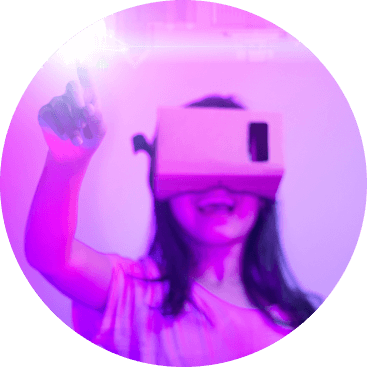
Implications of Education in the Metaverse
Constructing the future Metaverse for interactive and immersive 3D digital learning revolution
The immersive, ultra-realistic virtual spaces, and digital environments will present tremendous opportunities to the education sector. Whether it is related to campus activities, 3D simulations, virtual training, or classroom lectures, active participation and social connectivity will largely be activity-oriented and spiced with gamification. Metaversal learning will augment the overall experience by presenting multiple approaches and solutions to a problem, thereby stimulating critical and creative thinking.
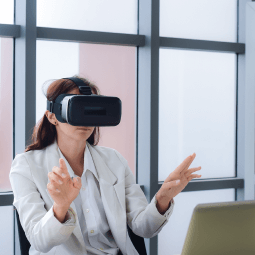
Metaverse Communities and Learning
The educational services in the metaverse will largely be customizable, as the learning scenarios of various institutions and training centers will differ a lot. Teaching in the future will be more of a content creator role and communities will develop their own sharable learning content in the metaverse.
People would be able to connect with other users from different parts of the world and learn from them in an immersive way. The learning materials in the metaverse would have a spatial and social dimension which would essentially provide more context to learners.
Immersive Storytelling
With profound digital transformations and the evolution of the ambient web, immersive storytelling has carved its way through diverse forms of media distribution. While enterprise training, full-length digital educational courses, product studies, and virtual knowledge sessions are coherently becoming the new norm in the education sector, it will immensely benefit from progressive metaverse implementations.
These virtual environments and immersive 3D learning packages will shape the future of education, culture, communication, economy, and society.

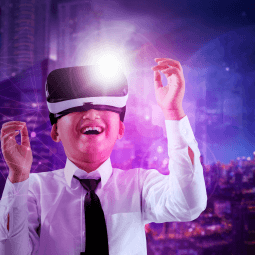
Smart Glasses with AR
As metaverse services continue to expand their reach in diverse sectors, tech titans have already started investing in building their own version of smart glasses. The integration of Augmented Reality with smart glasses will inculcate a plethora of smartphone features and will take the learning experience to a whole new level. For the education industry, it will undoubtedly be a monumental step forward.
AR will enable learners to engage with virtual objects in the surrounding physical environment or to access data/information related to physical objects. This information layering of metadata will prove to be a revolutionary way to educate and learn.
Immersive 3D Environments
Interactive learning that involves social collaboration and active participation can be facilitated with the development of seamless digital environments conducive to experiential thinking. From stepping into immersive virtual reality spaces and engaging with online 3D avatars to digitally reviewing learning materials and observing virtual products, education in the metaverse will cater to a plethora of training and learning requisites.
Moreover, AI virtual assistants can be used as virtual coaches, study guides, or for quick knowledge access in the immersive 3D environments constructed in the metaverse.
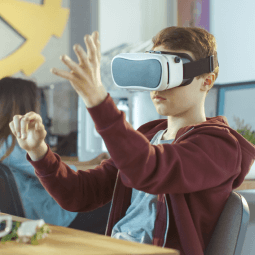
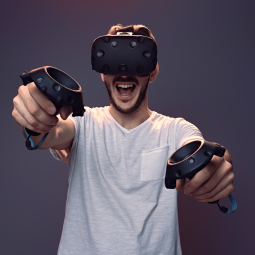
Gamification of Virtual Classrooms
The key functionality of gamification is to construct an ultra-real, interactive environment that overlays educational content and dictates actions within the virtual classroom. Integration of interactive VR enables the experiencer to be a central part of the learning process and encourages them to explore the subject from diverse perspectives.
Gamifying the classroom experiences will allow educators to establish and cultivate more productive relationships with students through the replication of conventional learning environments in the classroom.
Advanced Simulations
Training and education will take a more immersive, dynamic, and interactive form in the metaverse. Instead of studying in the conventional sense, metaversal learning will be experienced, practiced, and will be achieved through advanced simulations. VR-powered digital simulations will predominantly prove to be extremely effective as the audio & video spatiality will make it easier to form a contextual memory, crucial for long-term learning retention.
In the metaverse, digital simulations will be used in extremely creative ways to optimize learning through mind-bending virtual projections.

Cookies are important to the proper functioning of a site. To improve your experience, we use cookies to remember log-in details and provide secure log-in, collect statistics to optimize site functionality, and deliver content tailored to your interests. Click Agree and Proceed to accept cookies and go directly to the site or click on View Cookie Settings to see detailed descriptions of the types of cookies and choose whether to accept certain cookies while on the site.












